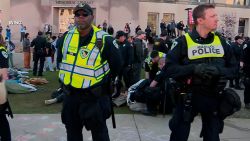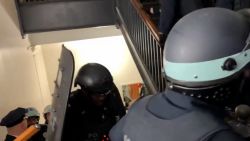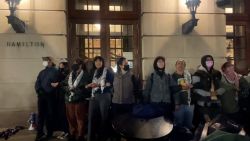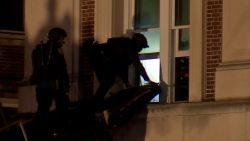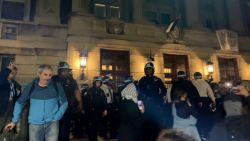California Democratic Gov. Gavin Newsom has embarked on an aggressive new effort to push back against the well-funded effort to recall him, arguing that the campaign is being driven by followers and allies of former President Donald Trump, who is deeply unpopular in California, as he tries to marshal the state’s Democrats to stand behind him.
In an interview with CNN’s Jake Tapper on “The Lead” Tuesday, Newsom acknowledged that he is worried about the recall and expects it to qualify for the ballot, which could create a risky and unpredictable scenario for the California governor if Democrats do not show up to defend him with their votes in what could be a low-turnout election.
If the measure qualifies, voters would be asked in a first question whether they want to recall Newsom and then a second question asking who he should be replaced with. When California voters recalled former Gov. Gray Davis, a Democrat, in 2003, they chose from a long list of names and replaced him with former Gov. Arnold Schwarzenegger, a Republican. To broaden his base of support, Newsom is framing the potential recall as being much bigger than himself – and instead as a multi-layered partisan attack that threatens the progressive goals and agenda he has championed.
“All you need is about a quarter of the people that voted for Donald Trump to get this recall petition to the voters this November, so I’m anticipating it goes on (the ballot). We’re taking it very seriously,” Newsom told Tapper.
As he tries to portray the recall effort as a fight against Trumpism, the California governor has characterized some of the recall proponents as members of right-wing militia groups, QAnon sympathizers, conspiracy theorists and members of White supremacist groups. When Tapper noted that the recall has actually drawn a far broader base of support among Republicans and independents who are unhappy with his handling of the Covid-19 pandemic, Newsom acknowledged that “it’s been a difficult year, and in hindsight, we’re all experts.”
A year ago this week, “California was the first state to initiate a stay-at-home order,” he added. “I think we saved thousands and thousands of lives,” he said, adding that he respects the views of those who believe the stay-at-home measures were too harsh and too detrimental to businesses.
‘What on Earth were you thinking?’
Newsom also allowed that the recall effort gained momentum after he angered some Californians by attending a now infamous birthday dinner at French Laundry in Napa Valley last November at a time when he was encouraging Californians to mask up and avoid large social gatherings.
“You called it a mistake to go, but what I was wondering at the time – and I don’t think you’ve answered – what on Earth were you thinking?” Tapper asked Newsom.
Newsom noted that the event was the 50th birthday of a friend of more than 20 years and that restaurants were open in the vast majority of the state on that date. But he reiterated that it was “a mistake” and that he “should have gotten up and left” when he saw that “there were too many people at the table.”
“That was inconsistent with what I was expressing (to Californians at that time). I’ve made this crystal clear on ad nauseum occasions. It was a mistake. I haven’t made a mistake like that before or since,” Newsom told Tapper. “We own that. We’re human. And you have to move on – and I’ve been moving on doggedly to fight every single day to get our kids back into school, get people vaccinated and get this economy moving again.”
The California Governor appeared on “The Lead” a day before the deadline for recall proponents to submit nearly 1.5 million signatures to the state’s county registrars for verification. Organizers say they have collected more than 2 million signatures, a goal they set to make sure they had a cushion to account for duplicates or invalid entries. (The threshold set by the state of 1,495,709 signatures for the recall to qualify is equivalent to 12% of the vote in the last gubernatorial election.)
‘Of course I’m worried about it’
Now that the recall appears likely to qualify for the ballot, Newsom has abruptly changed strategy – shifting from brushing off questions about it to calling it a serious threat to Californians. In the last two days, the governor has engaged in an unusual media blitz as his team has launched his new counter-effort, Stop the Republican Recall, to raise money and fire up Democratic support by casting recall proponents as extremists, anti-vaxxers and the kinds of violent insurrectionists who stormed the US Capitol on January 6 in support of Trump.
One reason the recall now looks likely to qualify is because of the high signature validity rate thus far. Though the verification effort is going slowly at the state level – the most current report from the California Secretary of State’s Office said that of the nearly 800,000 signatures verified by county officials so far, nearly 84% were valid.
“Am I worried about it? Of course I’m worried about it,” Newsom said on ABC’s “The View” earlier Tuesday. “The nature of these things – the up or down question – the zero-sum nature of the question is challenging … so we’re taking it seriously.”
The recall effort was launched last year by Retired Yolo County Sheriff’s Office Sgt. Orrin Heatlie and 124 other people who filed a petition to recall Newsom based on what they view as his role in the state’s high taxes, widespread homelessness, lack of affordable housing, out of control wildfires and rolling blackouts.
But over the course of the year, the effort broadened to include Californians who were angered by Newsom’s management of the coronavirus pandemic – particularly the restrictive lockdowns last spring and then over the winter holidays that the governor believed would help control the spread of the virus as cases soared and intensive care units hit capacity in the Golden State.
The groups gathering the signatures have submitted them to county registrars across the state on a rolling basis, and county officials are verifying each submission to determine its validity, a process that could extend well into the end of April. After that process is complete, there are an additional series of procedural steps required by state law, so it is unclear exactly when a recall of Newsom – if it qualifies – would land on the ballot.
Interview push wades into tricky territory
The governor’s blitz of interviews forced him into politically perilous territory when he answered a question Monday on MSNBC about whether he would replace Democratic California Sen. Dianne Feinstein – if she were to retire – with a Black woman to broaden representation in that chamber after Vice President Kamala Harris’ exit.
Newsom said on MSNBC that he had “multiple names in mind” of Black women he could appoint to replace Feinstein. The subject has come up with some frequency in recent months as progressive activists angry with Feinstein have raised questions about her age and fitness to serve.
But Feinstein has no plans to step aside, confirming Tuesday to CNN that she plans to serve out the duration of her term. She said Newsom’s comments were misinterpreted and described them as “very good friends,” stating that reporters were making “a mountain out of a molehill.”
Newsom told Tapper that he made the mistake of answering that direct question about Feinstein, but clarified that he expects her to remain in the US Senate and said he has “tremendous respect” for her. He called her a true friend and said he counts her among his mentors in San Francisco, where she was an “extraordinary” mayor and member of the county board of supervisors, he said.
“She’s not going anywhere. I talk to her all the time,” Newsom said. “But in the context of that question about a hypothetical, yeah, I answered it, and I stick by my answer, but I have all the confidence in the world that I’ll never have to make that decision.
This story has been updated with additional quotes from Newsom’s interview on “The Lead” and other context.













